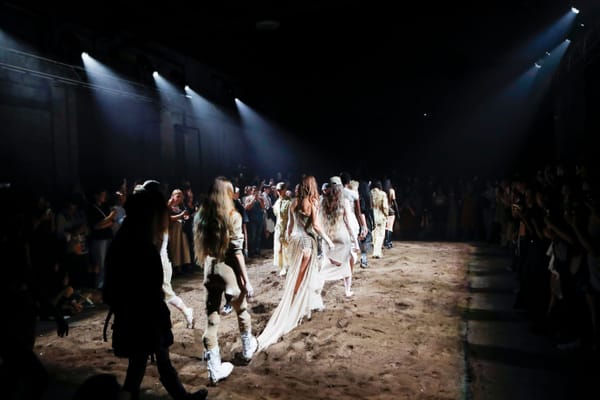Elena Velez, a mother of two from Wisconsin, has become one of the most controversial and celebrated figures in the fashion industry. One could see why at her recent show, titled The Longhouse, in reference to a term popularized by the online right to criticize what it sees as the excessive feminization of society. Guests entering the Brooklyn warehouse were confronted with the sight of mud spread all over the floor. Then, a hard-hitting industrial techno soundtrack began to blare, and the models appeared. They wore bizarre evening wear that seemed to contort around their frames, some of them with their hands tied behind their backs. At the show’s end, the models tackled one another and thrashed about, ruining their clothes as the entire cast descended into a pandemoniac mud fight. Purple magazine editor Olivier Zahm called it “the most poetic and emotional show” of New York Fashion Week. Not since Alexander McQueen’s runway extravaganzas like the Highland Rape show has the surrealist potential of the fashion show been so fully realized.
Artists like McQueen, Martin Margiela, Rick Owens, and Helmut Lang once managed to encode subversive sentiments into commercially driven work. But fashion proved to be far from immune from the ideological totalizations of the 2010s. Sure, the decade had its geniuses, but the industry underwent a diversification campaign that can only be described as a kind of haute bourgeois affirmative action. Subpar designers like the late Virgil Abloh were lionized. Call-out Instagram accounts like Diet Prada flourished despite contributing nothing more than public complaints about designers’ failures to adhere to the Current Thing; fashion stopped being fun.
“Ideological suffocation has been the background ambient noise of the last 10 years,” Velez tells me. “Unfortunately I don't think fashion will ever be the Caligulan bacchanalia that it was in the ’80s and ’90s.” Velez is bringing courage, both creatively and ideologically to the scene. Her employment of the “longhouse” term is a case in point. Velez employs it to undermine simplistic feminist rhetoric. “I think any work that celebrates women indiscriminately, solely on the merit of their womanhood, is condescending and a cultural liability.” Clearly, Velez has no problem expressing her discontent—with the liberal paradigm or with the inability of the industry to financially support its upstart talents. When every other designer is scrambling to keep up with the ever-shifting progressive liberal decency mandates, Velez’s refusal to shut her mouth is inspiring. Very few avant-garde American designers feel as authentically American as Velez. After all, What is more American than the refusal to follow arbitrary rules and having the courage to say what you mean?
“Velez has no desire to cultivate an ‘edgelord’ persona.”
